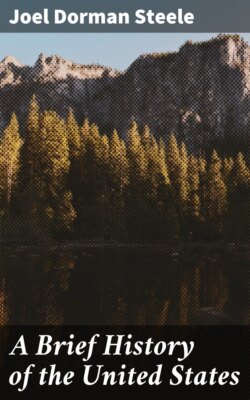Читать книгу A Brief History of the United States - Joel Dorman Steele - Страница 28
На сайте Литреса книга снята с продажи.
EXTENT OF THESE EXPLORATIONS.
ОглавлениеTable of Contents
1. The Spaniards confined their settlements and explorations to the West Indies and the adjacent mainland, and in the United States made settlements only in Florida and New Mexico.
2. The French claimed the whole of New France, and made their first settlements in Acadia and Canada.
3. The English explored the Atlantic coast at various points, and claimed this vast territory, which they termed Virginia, having made their first settlement at Jamestown.
[Footnote: After this time, the English is the only nation that directly influences the history of the United States. The country was settled mainly by emigrants from Great Britain, and in the next epoch all the colonies become dependencies of that empire.]
4. The Dutch laid claim to New Netherland, but made no settlement till 1613.
The Rival Claims.—These four claims overlapped one another, and necessarily produced much confusion. While the first few settlements were separated by hundreds of miles of savage forests, this was of little account. But as the settlements increased, the rival claims became a source of constant strife, and were decided principally by the sword.
[Footnote: It is noticeable that the English grants all extended westward to the Pacific Ocean, the French southward from the St. Lawrence to the Gulf, and the Spanish northward to the Arctic Ocean. None of the European nations had any idea of the immense territory they were donating.]
Two Centuries of Exploration and One of Settlement.—These explorations had lasted during the fifteenth and sixteenth centuries, and at the close of the sixteenth century, the only permanent settlements were those of the Spaniards at St. Augustine and Santa Fe. In the beginning of the seventeenth century, permanent settlements multiplied. They were made by
The FRENCH at Port Royal, N S., in 1605;
The ENGLISH at Jamestown, in 1607;
The FRENCH at Quebec, in 1608;
The DUTCH at New York, in 1613;
The ENGLISH at Plymouth, in 1620.
[Footnote: Here lay the shaggy continent from Florida to the Pole, outstretched in savage slumber. On the bank of the James River was a nest of woebegone Englishmen, a handful of fur-traders at the mouth of the Hudson, and a few shivering Frenchmen among the snowdrifts of Acadia; while amid still wilder desolation Champlain upheld the banner of France over the icy rock of Quebec. These were the advance guard of civilization, the messengers of promise to a desert continent. Yet, not content with inevitable woes, they were rent by petty jealousies and miserable quarrels, while each little fragment of rival nationalities, just able to keep up its own wretched existence on a few square miles, begrudged to all the rest the smallest share in a domain which all the nations of Europe could not have sufficed to fill.—Parkman.]
Summary of the History of the First Epoch, arranged in Chronological Order.
1492. Columbus discovered the New World, October 12 1497. The Cabots discovered Labrador, July 3 1498. The Cabots explored the Atlantic Coast South America was discovered by Columbus, August 10 Vasco de Gama sailed round the Cape of Good Hope and discovered a passage to India 1512. Ponce de Leon discovered Florida, April 6 1513. Balboa saw the Pacific Ocean, September 29 1519–21. Cortez conquered Mexico 1520. Magellan discovered and sailed through the straits which bear his name, into the Pacific Ocean; and his vessel returning home by the Cape of Good Hope, had made the first circumnavigation of the globe 1524. Verrazani explored the coast of North America 1528. Narvaez explored part of Florida 1534–35. Cartier discovered the Gulf of St. Lawrence and ascended the river to Montreal 1539–41. De Soto rambled over the Southern States and in 1541 discovered the Mississippi River 1540–42. Cabrillo explored California and sailed along the Pacific Coast 1541–42. Roberval attempted to plant a colony on the St. Lawrence, but failed 1562. Ribaut attempted to plant a Huguenot colony at Port Royal, but failed 1564. Laudonniere attempted to plant a Huguenot colony on the St. John's River. It was destroyed by the Spaniards 1565. Melendez founded a colony at St. Augustine, Florida; first permanent settlement in the United States 1576–7. Frobisher tried to find a northwest passage; entered Baffin Bay, and twice attempted to found a colony in Labrador, but failed 1578–80. Drake sailed along Pacific Coast to Oregon; wintered in San Francisco, and circumnavigated the globe 1582. Espejo founded Santa Fe; second oldest town in the United States 1583. Gilbert was lost at sea 1583–7. Raleigh twice attempted to plant a colony in Virginia 1602. Gosnold discovered Cape Cod, May 14 1605 De Monts established a colony at Port Royal, Nova Scotia first permanent French settlement in America 1607 The English settled Jamestown first permanent English settlement in America, May 23 1608 Champlain planted a colony at Quebec first permanent French settlement in Canada, 1609 Hudson discovered the Hudson River, Champlain discovered Lake Champlain, 1613 Settlement of New York by the Dutch, 1620 Pilgrims settled at Plymouth first English settlement in New England December 21
